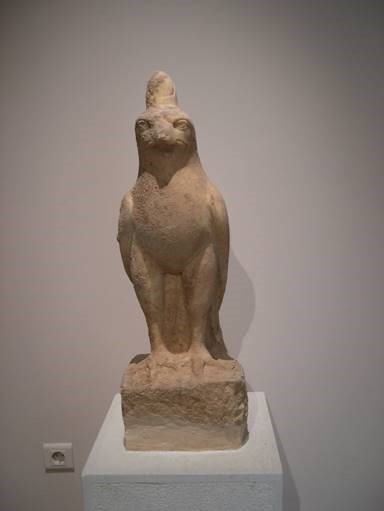Thursday, April 13
4:30p.m.
Olds Upton, room 103
The Department of Classics is proud to bring to Kalamazoo College, Dr. Lindsey Mazurek as she presents her talk:
Imagining a Greek Home for an Egyptian Goddess:
Time, Landscape, and Architecture in Greek Sanctuaries to Isis
When Isis first arrived on Greek shores in the 3rd century BCE, her new followers had to build sanctuaries appropriate to an Egyptian goddess. In the process of imagining a place for their Greek Isis to dwell, devotees came up with a wide range of eclectic solutions that intertwined local needs, imperialist fantasy, and fantastical chronology. These sanctuaries do not draw from contemporaneous Egyptian art and architecture, but rather from Greek stereotypes about Egypt and the Nile River. Isis’ Greek temples, Dr. Mazurek argues, allowed Greek devotees to imagine Egypt in a way that responded to their own experiences as provincial subjects of the Roman Empire.
Dr. Mazurek will begin with a brief overview of Isis’ and Sarapis cults’ arrival in Greece in the early Hellenistic period. Then, she will turn to literary evidence, in which Greco-Roman authors from Herodotus to Pliny the Younger characterize Egypt as a timeless and strange place and highlight its unique flora and fauna. Next she traces the popularity of these ideas in wall paintings and mosaics, where depictions of the Nile convey ideas of otherness and imperial control. Dr. Mazureck will conclude by discussing the sanctuaries of the Egyptian gods at Marathon and Gortyna. The sanctuary at Marathon combines imaginative architecture that resembles Pharaonic Egyptian temples, archaizing sculpture that evoked a timeless Greco-Egyptian past, and a riverine setting that recalled the Nile Delta. At Gortyna, the sanctuary includes both an underground water crypt that echoed the Nilometers used to measure the river’s annual flood and cattle statuettes that personified the river’s waters. Taken together, this evidence suggests that Greek devotees used sanctuary spaces to explore Greek conceptions of Egypt as an imagined, far-off, and ancient place they could control in much the same way Rome controlled and imagined Greece.

Dr. Lindsey Mazurek
Assistant Professor, Classical Studies
Adjunct Assistant Professor, Art History
Indiana University Bloomington
Dr. Mazurek’s research explores questions of ethnicity, religion, landscape, and change in the Roman provinces, particularly how the inhabitants of Rome’s provinces reconfigured their own ideas of themselves and their world in response to Roman rule. Her book, Isis in a Global Empire: Greek Identity Through Egyptian Religion in Roman Greece (Cambridge University Press 2022) looks at the worship of Egyptian deities like Isis, Sarapis, and Anubis in Greece during the Roman period and examines how local devotees reconfigured traditional ideas about Greekness in response to their religious practices. Some of her research from this project appeared in American Journal of Archaeology and Hesperia. She has also written on Hellenistic seascapes and migrations, particularly at Delos and in the province of Macedonia, and is currently co-editing a new volume on mobility in antiquity for Routledge. Her second book project examines portraiture and other forms of self-fashioning in the Greek city of Thessaloniki during Roman occupation.
